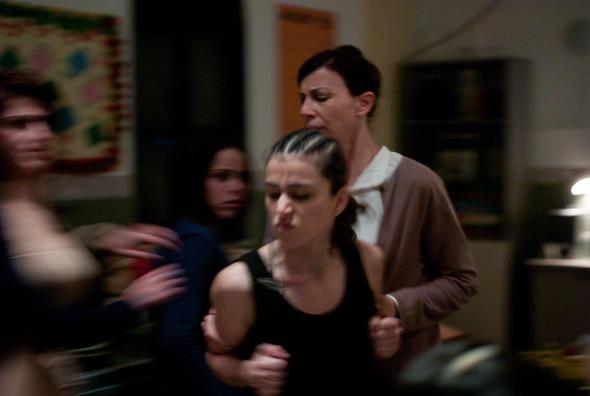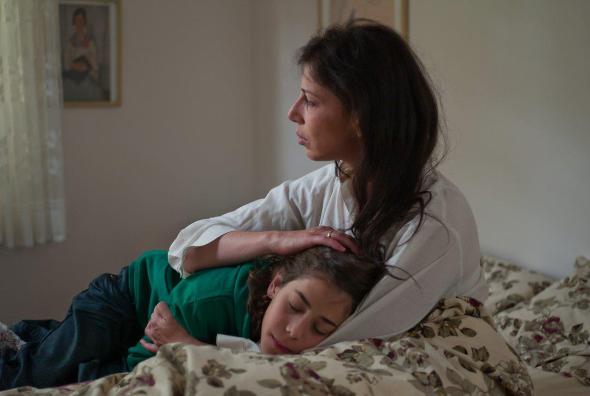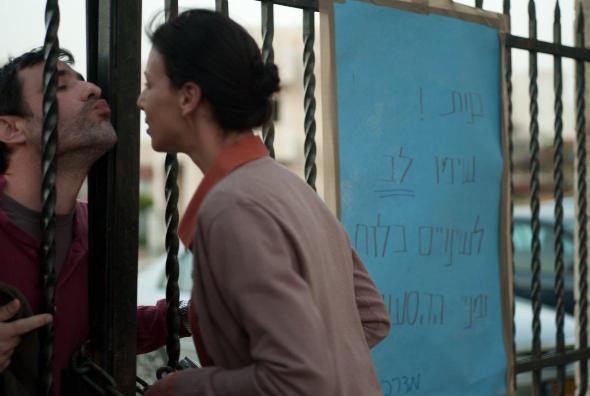Alice, the new film written and directed by Dana Goldberg, starts very well. So well, in fact, that I think the first few minutes ought to be made compulsory viewing for film students learning how to establish character, setting and tone with authority and an economy of effort.
As the film begins, a woman flags down and enters a bus, the camera trained on her as the bus traverses the city, dusk crosses into night. Her features are severe and unforgiving, as is her clothing: hair scraped back, lips pursed, a long skirt and cardigan from another age.

Her destination is work, a residential home for troubled teenaged girls. Trouble awaits her, one girl beating up on another, which she resolves with the unambiguous authority of a backhand slap. She tends to the bruises of the victim, unexpected maternal instincts mixed with a decidedly ambiguous intimacy. But her next scene is transparent enough: a secret tryst, hidden away from her charges, with her male lover. We already begin to feel that our principal, the eponymous Alice, is trapped between public and private faces, the first unyielding and unforgiving, the other tender but vulnerable.
But there is more. Her shift over, she returns home. Her husband waits at the door of their flat in the early morning light, but her coldness stands in stark contrast to the passion she revealed and revelled in not long before. She undresses mechanically, rebuffs attempts at emotional contact, falls into a deep sleep. Hours later, her alarm rings and her 9-year-old son clambers into bed with her. She rejects him sharply; he recoils, she pauses then relents, hugging him close, regretting her sharpness from a moment before. This is Alice.

The character study of a woman who has toppled over the edge into an abyss, Alice is not an easy film to watch. Rather than numbness, her pain has a raw and keening tone that communicates itself all too clearly. Brief yet unflinching, there is a truthfulness about the portrait that makes it all the more difficult to absorb.
Dana Goldberg’s minimalist script and directing shape a claustrophobic intensity, a convincing projection of Alice’s internal world. Pinch-faced, bags under her eyes, a haunted expression resides permanently on her face. She faces reminders of her imperfect life at every turn. Her charges, young women from broken homes fed medication in the hope – if perhaps not the expectation – of compliance are the mirror image of her internal world: fractured, vainly hoping to be healed. When Yoel, her lover, creeps in and out of the facility, she allows free rein to her suppressed sensuality and passion. But this is a mere oasis of fulfilment, magnifying the uncertainty of the rest of her days. She accuses Yigal, her husband, of watching over her like a prison guard. She does not want to be incarcerated, she wants to be protected.

I rather wish that Goldberg had managed to sustain the directness of the first few minutes across the film as a whole. Alice is untidy at times: home, work, child and lovers, the challenges bleed into one another. This isn’t actually a bad thing, given the life is not as tidy and as compartmentalised as we might like it to be. But this is Alice’s life we are talking about, and she is the sum total of influences external as well as internal. Ilanit Ben-Yaakov evokes her character to tightly-wound perfection, but broadly, we can only assume that those around her have a similar emotional hinterland to draw upon. There is a disconcerting sameness about Yigal, her husband, and Yoel,her lover. The neither (payed by Haim Znati and Amos Shouv respectively) leave more than a transient impression is the consequence, I think, of slender character development. Eli, her son, evinces a charming lack of guile (this is largely down to Itai Naveh’s composure of in his role). But I’m not entirely convinced that the role captures the child’s age accurately. In the children’s home, a burgeoning relationship between Neta (Darya Sheizaf) and Vered (Neta Bar Rafael) pushes Alice into an uncomfortable corner. I can’t say that I was totally convinced by the two; where Goldberg’s narrative shorthand works to excellent effect elsewhere, the physical contrast between the two girls feels cliched.
But these are reservations, rather than indictments. The saving grace of tortured souls like Alice is too often a chance at sublimation, channelling frustration and disappointment and the inarticulate but overarching sense of dread and desperation into some higher ideal. But that’s stuff for the movies. Real life doesn’t work quite so neatly, and Goldberg refuses to give Alice an easy opt-out. Just the faint hope that after she does touch bottom, she might just be able to find her way back to the surface once more.
Alice (2012), Written and Directed by Dana Goldberg
Starring Ilanit Ben-Yaakov, Darya Sheizaf, Neta Bar Refael, Amos Shouv, Haim Znati, Itai Naveh
82 mins, Hebrew w. Hebrew and English subtitles.





